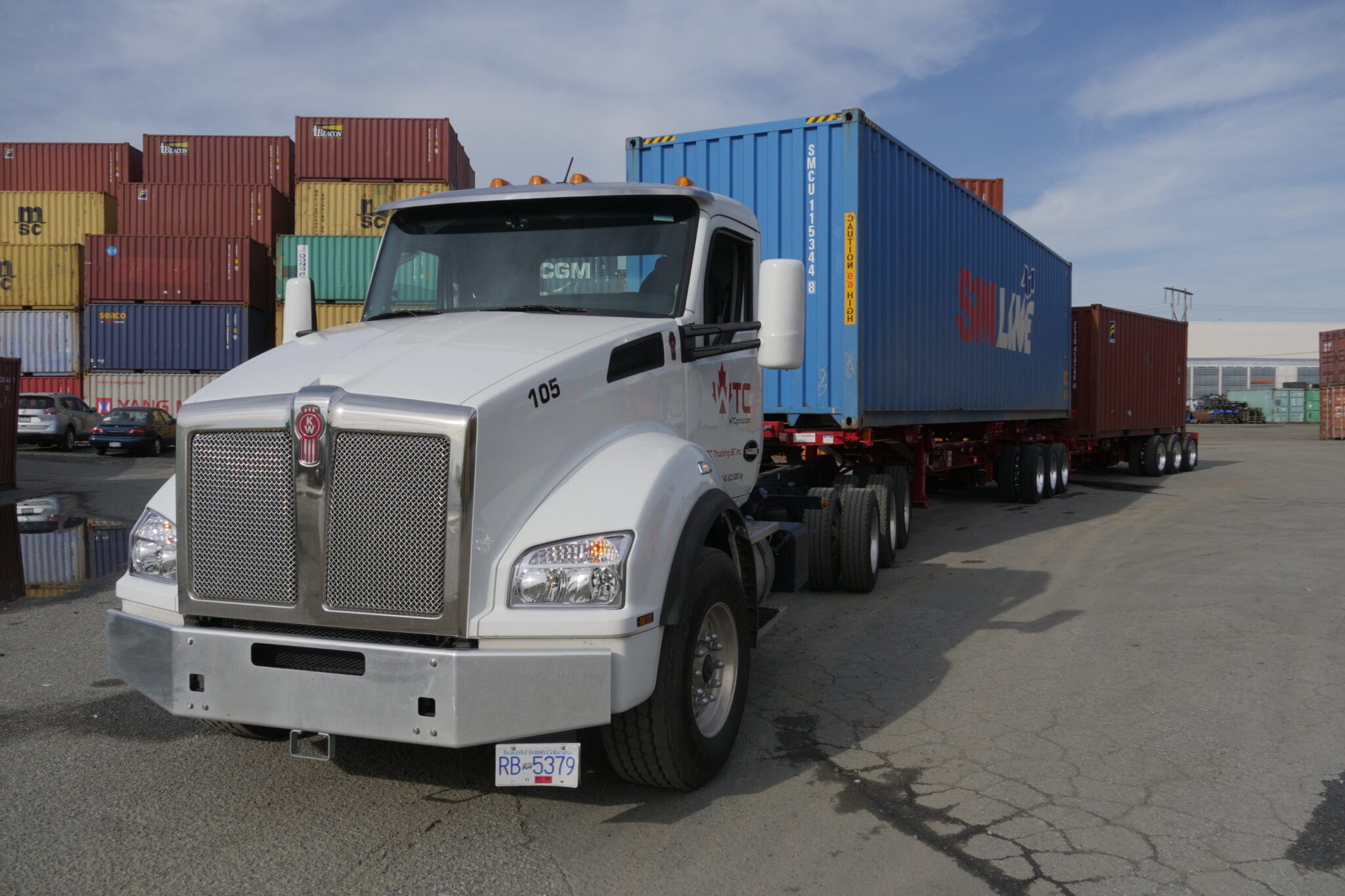Over the past few decades, we’ve seen a dramatic shift towards sustainability. As awareness grows, more individuals and companies adopt eco-friendly practices, reshaping consumer behavior and business ethics.
This shift is significant in the logistics industry, where the global transportation of goods is inherently resource-intensive. WTC Group is leading this charge by embracing greener technologies and fuels to pioneer sustainable logistics solutions.
At the forefront of our sustainability efforts is the transition to Petro Canada EcoDiesel, initiated in 2023. Now, after a full year of powering our trucking fleet and entire terminal operations, including container handlers, reach stackers and rail shuttles, through the EcoDiesel transition, our experts set out to analyze the impact of this change.
In this post, we explore data collected over the past year, reviewing our emissions reductions and examining the broader implications of our shift to EcoDiesel on our future operations. Let’s lay out the tangible benefits of this transition and what it means for the future of eco-conscious logistics.
WTC’s Switch to EcoDiesel
Our switch to EcoDiesel came about as part of a broader initiative to enhance the environmental sustainability of WTC’s operations. Initially, we introduced EcoDiesel in a pilot program, where we used it in one out of every 20 fill-ups to gather data and assess its feasibility and impact on our operations.
The positive results from this testing phase—coupled with WTC’s ongoing efforts to reduce the carbon footprint of its logistics operations and the encouragement of its eco-conscious partners—paved the way for a full-scale transition. We began implementing full-scale transitioning for the renewable diesel in January 2023. We will finish the switch over the next 12 months so that our internal fleet runs on 100% EcoDiesel.
EcoDiesel, derived primarily from waste feedstocks such as used cooking oil, significantly reduces greenhouse gas (GHG) emissions—up to 80% compared to conventional diesel. By using EcoDiesel, we’re helping to cut down landfill waste and aligning with WTC’s commitment to sustainability without compromising the performance of our fleet.
The fuel’s high cetane number ensures it burns cleaner and more efficiently, maintaining the diesel engines’ operational integrity and performance. Moreover, EcoDiesel can be seamlessly integrated into existing diesel engines and fuel infrastructures, eliminating the need for costly modifications or new technologies.
Learn more about EcoDiesel Fuel.
Emission Results for WTC Group
From January 2023 to April 2024, WTC Group has reduced 661.4 metric tons of CO2 equivalent (CO2e) emissions. This number is the same as removing 144 cars from the road or planting over 787,000 trees! These statistics underscore the direct benefits of switching to EcoDiesel and highlight WTC Group’s commitment to a more sustainable and responsible logistic operation.
Comparing EcoDiesel with Other Common Fuel Sources
| Type of Fuel | CO2e Tons Emitted per 1000 Liters |
| Dyed Diesel | 2.694 |
| Renewable Diesel R100 | 2.695 |
| Seasonal ULS | 2.703 |
| B5 Biodiesel | 2.693 |
| EcoDiesel | 2.150 |

Based on the data we’ve collected during our transition, our complete transition to EcoDiesel will have a significant impact in the next 12 months.
We’ve set a formidable goal for this coming year. Our projections indicate we will use upwards of 715,000 litres of fuel, and by using 100% EcoDiesel, we’re cutting operational emissions to just 512.85 tons of CO2e.
This substantial increase in the use of EcoDiesel is expected to save an impressive 1,915 tons of CO2e, effectively offsetting 99.29% of WTC’s emissions from operations. This is equal to removing 600 cars from the road!
A Closer Look at EcoDiesel
EcoDiesel’s environmental benefits extend beyond emission reductions. It contains negligible sulphur and aromatic compounds, making it a cleaner-burning and less polluting option. It’s also versatile enough to be used in various temperatures, from as low as -20°C to -6°C, making it an ideal year-round fuel choice in temperate climates. During colder months, it can be specially formulated to maintain operability, adapting to seasonal changes without losing efficiency.
EcoDiesel vs. BioFuel
While both EcoDiesel and BioFuel are considered greener alternatives to conventional diesel, they differ significantly in their production and overall environmental impact. BioFuels, typically produced from agricultural crops, often raise land use and food supply concerns.
In contrast, EcoDiesel is produced from waste materials, which not only helps reduce waste but also sidesteps certain issues associated with production of other alternative fuels such as BioFuel.
Moving Forward with EcoDiesel
The past year has been a testament to WTC Group’s dedication to reducing our company’s carbon footprint. By embracing EcoDiesel, we have not only demonstrated the viability of renewable fuels in heavy-duty transportation but have also paved the way for other companies in the logistics sector to follow.
As we look to the future, the continued expansion of EcoDiesel usage promises further reductions in greenhouse gas emissions and a blueprint for sustainable growth in an industry traditionally dominated by fossil fuels.WTC Group is an excellent choice if you’re looking for a sustainably-focused, experienced logistics service provider. Contact us to learn more about our logistics services and our commitment to sustainable business practices.
